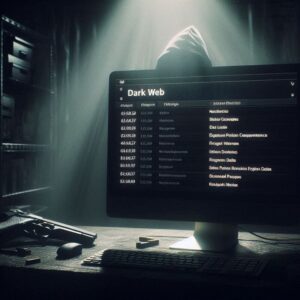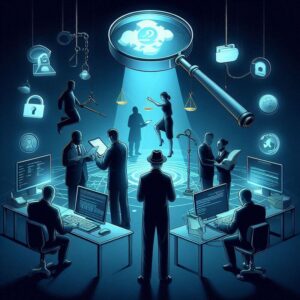Mastering Dark Web Investigations: Key Strategies and Insights for Success
The Dark Web is a complex and often misinterpreted segment of the internet that operates outside the reach of traditional search engines and standard browsing techniques. Accessing this hidden network necessitates the use of specialized software and specific configurations, contributing to its mystique. This obscure digital domain is marked by a high level of user anonymity and untraceability, creating an ideal environment for various illicit activities. While it has gained a notorious reputation for facilitating serious crimes such as drug trafficking, arms dealing, and human trafficking, it also serves as a marketplace for cybercriminals who trade stolen data and sensitive information. Within this shadowy landscape, users engage in unlawful transactions, join exclusive forums, and connect with communities that operate beyond legal scrutiny, often feeling insulated from law enforcement’s reach.
In contrast to the conventional surface web, the Dark Web is expertly designed to safeguard user identities through advanced encryption technologies and multiple layers of anonymization. Most individuals access this hidden digital realm using specialized tools like Tor (The Onion Router), which anonymizes online activities by routing internet traffic through a network of volunteer-operated servers. This intricate routing mechanism significantly obstructs efforts by anyone trying to monitor network traffic, rendering it extremely challenging to trace a user’s physical location or online behavior. While the Dark Web provides a secure communication platform for whistleblowers and political dissidents, its infamous reputation largely arises from its connections to criminal enterprises, posing major challenges for law enforcement agencies striving to uphold order.
Effective Techniques for Safe and Efficient Navigation of the Dark Web
- Understand that the Dark Web is a hidden segment of the internet, requiring specific software for access, and is frequently associated with illegal activities.
- Be mindful that navigating the Dark Web involves significant risks, including identity theft, financial scams, and exposure to harmful or explicit content.
- DarkSearch is a vital tool that enables users to explore the Dark Web securely through its anonymous search engine capabilities.
- Prepare to encounter a blend of illegal products and services, stolen data, black market transactions, and even legitimate content during your exploration of the Dark Web.
- To ensure a safe experience while exploring the Dark Web, using a secure VPN, exercising caution with links, and managing personal data sharing are essential practices.
Identifying and Addressing Risks Linked to the Dark Web
The Dark Web poses significant risks, not only for individual users but also for society at large. This clandestine area of the internet has emerged as a central hub for criminal enterprises, including the rampant trade of narcotics, firearms, and stolen personal information, which sustain various global criminal organizations. The perilous nature of this environment amplifies the likelihood of identity theft, financial fraud, and other cybercrimes, potentially wreaking havoc on the lives of unsuspecting users. The anonymity provided by the Dark Web complicates law enforcement’s attempts to monitor and apprehend offenders, giving cybercriminals a false sense of security as they partake in illegal activities.
Furthermore, the Dark Web plays a disturbing role in facilitating human trafficking and exploitation. Its unregulated and anonymous nature creates a haven for traffickers, leading to a troubling rise in the online exploitation of vulnerable groups, especially young individuals who may be coerced into sex work or other forms of modern slavery. Additionally, the Dark Web often acts as a breeding ground for extremist ideologies and terrorist propaganda, posing serious threats to national security and public safety. This reality highlights the urgent need for ongoing vigilance and proactive measures from society to combat these profound dangers.
The widespread presence of illicit content and activities within the Dark Web carries extensive societal implications. It cultivates a culture of lawlessness that undermines efforts to foster a secure online ecosystem. Therefore, it is crucial for users to remain vigilant regarding the inherent dangers associated with the Dark Web and take proactive steps to protect themselves from its potentially harmful consequences.

Expert Guidance for Safely Exploring the Dark Web with DarkSearch
DarkSearch is an innovative search engine specifically designed to empower users in securely and privately navigating the Dark Web. This cutting-edge tool enables individuals to search for specific content while preserving their anonymity and personal privacy. DarkSearch utilizes robust encryption and privacy measures, ensuring that users can explore the Dark Web without the ever-present threat of being tracked or monitored by malicious entities.
One of DarkSearch’s standout features is its ability to offer users a curated list of verified and trustworthy Dark Web websites. This functionality is critical for helping users avoid illegal or harmful content, directing them instead toward reputable resources and valuable information. Furthermore, DarkSearch incorporates built-in security measures designed to shield users from fraudulent sites and phishing scams, significantly lowering the risk of falling victim to cybercrime during their browsing experience.
In addition to enhancing security, DarkSearch opens up a wealth of information and resources that are often inaccessible on the surface web. This includes niche forums, marketplaces, and communities that cater to diverse interests, allowing users to connect with like-minded individuals in a secure and private space. By leveraging DarkSearch’s capabilities, users can responsibly navigate the Dark Web, avoiding the pitfalls associated with illegal activities while still gaining access to valuable insights and information.

Exploring the Diverse Content Landscape within the Dark Web
The Dark Web offers a vast array of content, encompassing both legitimate and illicit activities. Its infamous reputation primarily arises from its function as a marketplace for illegal goods and services, including the trade of drugs, firearms, counterfeit currencies, and stolen personal data. This secretive environment is particularly appealing to criminals seeking to conduct transactions with minimal risk of detection by law enforcement.
Beyond these illegal transactions, the Dark Web hosts forums and groups that engage in a wide variety of discussions, such as hacking, cybercrime, political activism, and whistleblowing. These platforms provide individuals with a secure space to partake in controversial discussions and share information without the fear of censorship or surveillance. However, they can also become breeding grounds for criminal behavior and extremist ideologies, presenting substantial threats to public safety and national security.
Despite its associations with illegal activities, the Dark Web fulfills critical functions. It offers a secure environment for whistleblowers and activists to share vital information and raise awareness about issues like corruption and human rights violations without fearing retaliation. Additionally, the Dark Web contains a wealth of resources and information that may be censored or unavailable on the surface web, making it an invaluable repository for those seeking alternative perspectives and uncensored knowledge.
Crucial Safety Protocols for Effective Dark Web Navigation
While exploring the Dark Web exposes users to various risks, several strategies can help safeguard against potential dangers. Utilizing specialized software like Tor enables secure browsing of the Dark Web. Tor effectively encrypts internet traffic, concealing users’ locations and online activities from potential surveillance or traffic analysis, thereby enhancing privacy.
Exercising caution is paramount during any Dark Web exploration. It’s essential to avoid clicking on unknown links or downloading unexpected files, as the Dark Web harbors numerous malicious sites aimed at stealing sensitive information or infecting users’ devices with malware. Users can bolster their security by limiting their visits to trusted and verified websites while navigating this hidden digital landscape.
Furthermore, individuals should refrain from sharing personal information or engaging in transactions on the Dark Web. The inherent anonymity of this environment makes it incredibly challenging to verify the legitimacy of merchants or buyers, significantly increasing the risk of scams and fraud.
Employing a virtual private network (VPN) can greatly enhance security while navigating the Dark Web. A VPN encrypts internet traffic and masks IP addresses, making it more difficult for malicious actors to trace or monitor online activities.
By adhering to these safety protocols and remaining vigilant during Dark Web explorations, users can significantly reduce their exposure to potential threats and protect themselves from the dangers associated with cybercrime.
Navigating Legal and Ethical Dimensions When Using DarkSearch
When using DarkSearch or engaging with the Dark Web, individuals must be acutely aware of the legal and ethical implications involved. Accessing certain types of content or participating in specific activities on the Dark Web may contravene local laws or ethical standards, potentially leading to serious legal repercussions or moral dilemmas.
A key legal consideration when utilizing DarkSearch is the risk of encountering illegal content or activities. Users must recognize that accessing illegal marketplaces or engaging in criminal actions on the Dark Web can result in severe legal consequences, including prosecution or imprisonment. Therefore, exercising caution and adhering to local laws during Dark Web exploration is essential to avoid unintentional violations.
Equally important is understanding the ethical considerations associated with using DarkSearch. Users should be mindful of the dangers of interacting with harmful content or facilitating illegal activities on the Dark Web. This includes avoiding transactions involving illicit goods or services, steering clear of criminal enterprises, and promptly reporting any illegal activities encountered during their exploration.
When accessing sensitive information or discussing controversial topics on the Dark Web, it is crucial to acknowledge the moral implications. Approaching such subjects with care and empathy is essential, as it recognizes the potential impact on individuals or communities affected by these issues.
By remaining vigilant and considering the legal and ethical factors while using DarkSearch, individuals can navigate the Dark Web in a responsible and safe manner.

Envisioning the Future of the Dark Web: Innovations and Their Potential Impacts
The dynamic landscape of the Dark Web is poised to undergo significant advancements and implications that could radically reshape its future trajectory. As technology continues to progress, concerns regarding the potential for increasingly sophisticated cybercriminal activities flourishing within the Dark Web are intensifying. Innovations in encryption techniques, anonymization technologies, and decentralized networks may further complicate law enforcement’s capability to monitor and regulate illegal activities within this concealed domain.
Moreover, the necessity for international collaboration in addressing the challenges posed by the Dark Web cannot be overstated. Given that illicit operations on the Dark Web frequently transcend national borders, the need for cooperative actions among governments, law enforcement agencies, and technology firms is critically important. This collaboration encompasses sharing intelligence, coordinating actions, and establishing regulatory frameworks designed to mitigate the risks associated with the Dark Web, highlighting the essential roles played by each entity in tackling this global challenge.
Additionally, ongoing discussions regarding potential government interventions aimed at combating unlawful activities on the Dark Web while safeguarding individual privacy rights are gaining momentum. Striking a balance between addressing cybercrime and protecting freedom of expression and internet privacy poses a complex challenge. As policymakers navigate these intricate considerations, they must prioritize informed decision-making to ensure that legislative measures effectively combat illegal activities on the Dark Web without infringing upon individual rights.
Future developments within the Dark Web will have profound implications for cybersecurity, law enforcement, personal privacy rights, and global security. By staying informed about potential trends and changes, individuals can better comprehend the evolving landscape of the Dark Web and take proactive measures to safeguard themselves from its associated threats.
In-Depth Answers to Common Questions About the Dark Web
What Characterizes a Dark Web Search Engine and How Does It Function?
A Dark Web search engine is specifically designed to assist users in navigating the Dark Web, a concealed segment of the internet that is not indexed by conventional search engines. This tool empowers individuals to discover and access hidden websites and exclusive content that is typically unreachable through standard web browsers, enhancing their exploration experience.
What Mechanisms Do Dark Web Search Engines Use to Operate?
Dark web search engines utilize specialized algorithms to crawl and index content located within the hidden corners of the Dark Web. These engines access concealed websites and extract information, making it searchable for users who wish to explore this hidden digital landscape more effectively and efficiently.
Is Utilizing a Dark Web Search Engine Legal?
Using a dark web search engine is not inherently illegal, as it serves merely as a tool for accessing content on the Dark Web. However, users must recognize that the Dark Web is often associated with illegal activities, and engaging with certain content or participating in unlawful actions may lead to legal consequences.
What Risks Should I Be Aware of When Using a Dark Web Search Engine?
Several risks accompany the use of dark web search engines, including exposure to illegal and harmful content, potential malware attacks, and the threat of being targeted by cybercriminals. Exercising caution and implementing appropriate security measures is essential when accessing the Dark Web to mitigate these risks.
Can I Access the Dark Web Without Relying on a Dark Web Search Engine?
Technically, it is possible to access the Dark Web without a search engine by using specialized software like Tor, which allows users to browse anonymously and reach hidden websites. However, utilizing a dark web search engine can streamline the process of locating specific content and enhance navigation through the Dark Web.
References:
Pros and Cons of Internet Usage – Good and Bad Effects. https://thetechprint.com/pros-and-cons-of-internet-usage
Is it Illegal to Access the Dark Web? – Exploring the Dark Corners of the Digital World: A Tale of Mexican Hackers. https://www.hackersmexicanos.com/is-it-illegal-to-access-the-dark-web/
The post Deep Search: Unveiling the Invisible Dark Web appeared first on Ezi Gold.
The Article: Dark Web Exploration: Discovering the Hidden Internet Depths Was Found On https://ai.ezi.gold
The Article Dark Web Exploration: Unveiling the Hidden Internet Secrets Was Found On https://limitsofstrategy.com
The Article Dark Web Exploration: Discovering the Internet’s Hidden Secrets First Appeared ON
: https://ad4sc.com
Comments are closed